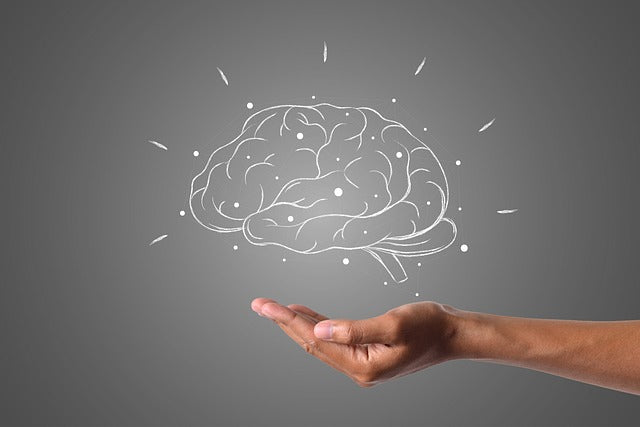Do you find yourself struggling to focus at work? Are you easily distracted by the ping of a new email landing in your inbox or the siren call of your social media apps on your phone? Is work stress impairing your ability to perform your best? If you answered yes to any of these questions, you are not alone!
The modern office is a frenetic place, making our brains busier than ever before. We are only just beginning to understand the implications of this cognitive hyperdrive on our performance, productivity, and long-term health. While escaping the vicious cycle of stress and distraction at work may seem challenging, it is not impossible! Healthy work habits and natural nootropics can help you hack your mind, supporting sustained mental sharpness and productivity while mitigating the adverse impacts of stress.
The Unintended Consequences of the High-Tech Workplace
Workplaces are increasingly relying on technology for all manner of activities, including communication and project management. While technology undoubtedly has its benefits, this “brave new workplace” also has some unintended consequences.
For one, the constant influx of information – texts, emails, and other messages – on our tech devices at work requires people to juggle competing mentally-demanding activities. According to MIT neuroscientist Earl Miller, the human brain is not designed to juggle multiple tasks simultaneously, a concept we refer to as “multitasking.” In fact, research indicates that multitasking decreases efficiency, and adversely impacts our brain function, hampering our cognitive abilities.1,2 While our society has long applauded multitasking, it looks like “single-tasking” may be the best way to rescue your productivity and sanity at work!
Another adverse consequence of the modern workplace is that it’s a significant source of distraction. Our smartphones and computers are easy sources of distractions, which may take the form of email, social media, and other apps. Frequent use of these devices takes us off-task, hindering our productivity. Recent statistics demonstrate that the average American checks her email 15 times a day and her phone a whopping 80 times a day!3,4 Each time you diverge from a task to check your phone or email, it takes an average of 25 minutes for your brain to re-focus. The sheer number of distractions we face at work, thus takes a significant toll on our overall productivity.5,6
The frenetic pace of activity in the modern workplace leaves many people feeling chronically stressed. Research indicates that chronic work stress hinders productivity and harms our long-term health. Occupational stress has been found to alter the functional connectivity of the brain, leading to impaired cognitive function and regional reductions in brain volumes.7,8 Chronic stress also increases the risk of burnout, a state of physical and emotional exhaustion accompanied by a sense of ineffectiveness and detachment from one’s job.9 The prevalence of burnout is surging in a variety of professions, ranging from healthcare to tech, and is associated with an increased risk of chronic illness.10
To thrive in the modern-day workplace, you must minimize distractions and healthfully manage stress. Adaptogens are plants that help the body adapt to stress and can be powerful allies in the modern workplace!
Adaptogenic Botanicals Increase Focus and Energy
Adaptogenic botanicals have been used for thousands of years by herbalists to ease stress and sharpen the mind. The adaptogens Ginseng, Erigeron breviscapus, and Epimedium brevicornum specifically target the brain, and can help you achieve laser-focus and high productivity at work!
Ginseng
Ginseng has been used as a health elixir and performance enhancer in traditional Chinese medicine for thousands of years. The main bioactive compounds found in ginseng, ginsenosides, support healthy cognitive function by upregulating cholinergic neurotransmission and balancing blood glucose.11
There are two main types of ginseng: Asian or Korean ginseng (Panax ginseng) and American ginseng (Panax quinquefolius). Asian ginseng has a stimulating effect on the brain, increasing intellectual work capacity and energy.12 American ginseng has a more calming, focusing effect and improves working memory.13 Combining these two forms of ginseng gives you the best of both worlds – a surge in cognitive energy along with enhanced, level attention.
Erigeron breviscapus
Erigeron breviscapus is an ancient traditional Chinese medicine with potent cognition-enhancing and neuroprotective properties. Breviscapine is an extract of Erigeron breviscapus that contains approximately nine unique molecules, including baicalein and scutellarin.
Several components of breviscapine demonstrate beneficial neurocognitive effects. Scutellarin alleviates LPS-induced cognitive dysfunction. LPS, or lipopolysaccharide, is an inflammatory product made by gut bacteria that induces brain inflammation when the body is under stress.14,15 Scutellarin also inhibits the deposition of inflammatory amyloid-beta proteins, protecting against cognitive decline.16 Baicalein enhances cerebral blood flow, delivering more oxygen and nutrients to the brain.17 These effects support healthy brain function, helping you perform your best at work.
Epimedium brevicornum
Epimedium brevicornum, also known as “Horny Goat Weed,” is another botanical from the TCM compendium that optimizes brain function. Icariin, a constituent of Epimedium, protects the body against the harmful effects of chronic stress, protects the brain from inflammation, and increases the growth of new neurons.18,19,20,21
Stay Sharp at Work with 4 Healthy Habits
While adaptogens can fortify your body against stress and enhance cognition, healthy work habits are equally important for staying focused and productive at work.
Reduce Distractions
Reduce the distractions in your work environment by turning off notifications on your phone. The only exception to this rule is if you have a job that requires you to immediately respond to calls, such as if you are an ER physician.
Next, limit your “screen time.” If you have an iPhone, you can use Screen Time Controls to set app time limits and curb your use of social media. If you have an Android, you can use its Digital Wellbeing tools.
Reduce your overall use of technology to minimize distractions at work. It can feel daunting figuring out where to cut back on technology since it is so interwoven into our lives; to get started, considering reading Digital Minimalism, which offers a philosophy of technology use in which you focus your “tech time” on a small number of carefully selected activities that support your goals and values.
Focus on one activity at a time at work. Rather than answering every email as it arrives in your inbox, set an alarm to check your email three times a day; this strategy reduces distractions and overall stress.22 Avoid texting, surfing the internet, and talking on your phone when you are in the middle of a project. Schedule your meetings, phone calls, and other appointments for a specific period each day (if possible) to avoid frequent work interruptions.
Clear Your Mind
Mindfulness has taken the corporate world by storm, with many notable companies implementing mindfulness training with their employees, including Google, Nike, and Apple.23 Mindfulness practices clear the mind, improving employee focus and reducing the attentional deficits caused by multitasking.24,25 Mindfulness also enhances creative thinking and improves executive function, a cognitive process crucial for carrying out complex tasks.26 If you are new to mindfulness and meditation, try Headspace and Calm for a friendly, time-efficient introduction to meditation!
Move Your Body
Exercise is known to positively impact cognition and mood.27 However, research suggests that fitting in exercise and non-exercise movement at work may be the best way to support your productivity and counteract work stress! Studies have found that people who engage in movement throughout the day, such as by working at a standing desk or going on brief walks (~5 minutes each) every couple of hours experience enhanced cognition, task performance, and engagement compared to their sedentary peers.28,29, 30 Break up your workday with a lunchtime exercise session, a couple of walks, and consider investing in a sit-stand workstation; your body and brain will thank you!
Don’t Underestimate the Power of Rest
Many of us pay lip service to the idea of “work-life balance,” but few of us actually commit to establishing this balance in our lives. Rest is essential for cognitive health, focus, and productivity. It activates the “default mode network,” a neural network that facilitates creative thinking.31
Sleep is a critical component of overall rest. Sleep resets neural connections in the brain that are critical for memory and learning, and sleep deprivation is well-known to impair work performance.32
Rest also includes engaging in hobbies and using your vacation time! Research shows that hobbies and vacation time rejuvenate the mind, enhancing work performance in the long run!33,34
The modern-day workplace can be intense and stressful at times, but you needn’t let it get the best of you! With the help of adaptogens and healthy workplace habits, you can maximize your focus and productivity, bringing your best self to work!
References
- Sanbonmatsu DM, et al. Who multitasks and why? Multitasking ability, perceived multitasking ability, impulsivity, and sensation seeking. PLoS One. 2013; 8(1): e54402.
- Ralph BC, et al. Media multitasking and behavioral measures of sustained attention. Atten Percept Psychophys. 2015; 77(2): 390-401.
- Murphy M. “The way you check email is making you less productive.” Forbes. 18 September 2016. https://www.forbes.com/sites/markmurphy/2016/09/18/the-way-you-check-email-is-making-you-less-productive/#659cb46937e3.
- “Are you addicted to your phone?” Asurion. https://www.asurion.com/connect/tech-tips/are-you-addicted-to-your-phone/. Accessed 11 September 2019.
- Mark G, et al. The cost of interrupted work: more speed and stress. Proceedings of the SIGCHI Conference on Human Factors in Computing Systems. Page 107-110.
- Altmann EM, et al. Momentary interruptions can derail the train of thought. J Exp Psychol Gen. 2014; 143(1): 215-226.
- Golkar A, et al. The influence of work-related chronic stress on the regulation of emotion and on functional connectivity in the brain. PLoS One. 2014; 9(9): e104550.
- Blix E, et al. Long-term occupational stress is associated with regional reductions in brain tissue volumes. PLoS One. 2013; 8(6): e64065.
- Maslach C, Leiter MP. Understanding the burnout experience: recent research and its implications for psychiatry. World Psychiatry. 2016; 15(2): 103-111.
- “Ending the stress and burnout epidemic.” Forbes. 26 Nov 2018. https://www.forbes.com/sites/nextavenue/2018/11/26/ending-the-stress-and-burnout-epidemic/#66915e3d4b41.
- Shin K, et al. Cereboost™, an American ginseng extract, improves cognitive function via up-regulation of choline acetyltransferase expression and neuroprotection. Regul Toxicol Pharmacol. 2016; 73: 53-58.
- Oliynyk S, Oh S. Actoprotective effect of ginseng: improving mental and physical performance. J Ginseng Res. 2013; 37(2): 144-166.
- Scholey A, et al. Effects of American ginseng (Panax quinquefolius) on neurocognitive function: an acute, randomised, double-blind, placebo-controlled, crossover study. Psychopharmacology (Berl). 2010; 212(3): 345-356.
- Baluchnejadmorjarad T, et al. Scutellarin alleviates lipopolysaccharide-induced cognitive deficits in the rat: Insights into underlying mechanisms. Int Immunopharmacol. 2017; 54: 311-319.
- de Punder K, Pruimboom L. Stress induces endotoxemia and low-grade inflammation by increasing barrier permeability. Front Immunol. 2015; 6: 223.
- Zeng YQ, et al. Scutellarin mitigates Aβ-induced neurotoxicity and improves behavior impairments in AD mice. Molecules. 2018; 23(4): 869.
- Liang W, et al. The effects of baicalin and baicalein on cerebral ischemia: A review. Aging Dis. 2017; 8(6): 85-867.
- Pan Y, et al. Icariin from Epimedium brevicornum attenuates chronic mild stress-induced behavioral and neuroendocrinological alterations in male Wistar rats. Pharmacol Biochem Behav. 2007; 87(1): 130-140.
- Pan Y, et al. Icariin attenuates chronic mild stress-induced dysregulation of the LHPA stress circuit in rats. Psychoneuroendocrinology. 2010; 35(2): 272-283.
- Jin J, et al. An outline for the pharmacological effect of icariin in the nervous system. Eur J Pharmacol. 2019; 842: 20-32.
- Li F, et al. Icariin decreases both APP and Aβ levels and increases neurogenesis in the brain of Tg2576 mice. Neuroscience. 2015; 304: 29-35.
- Kushlev K, Dunn EW. Checking email less frequently reduces stress. Comput Hum Behav. 2015; 43: 220-228.
- Levin M. “Why Google, Nike, and Apple love mindfulness training, and how you can easily love it too.” Inc. 12 Jun 2017. https://www.inc.com/marissa-levin/why-google-nike-and-apple-love-mindfulness-training-and-how-you-can-easily-love-.html.
- Good DJ, et al. Contemplating mindfulness at work: An integrative review. J Manag. 2016; 42(1)114-142.
- Gorman TE, Green CS. Short-term mindfulness intervention reduces the negative attentional effects associated with heavy media multitasking. Sci Rep. 2016; 6: 24542.
- Capurso V, et al. Mindful creativity: the influence of mindfulness meditation on creative thinking. Front Psychol. 2013; 4: 1020.
- Hogan CL, et al. Exercise holds immediate benefits for affect and cognition in younger and older adults. Psychol Aging. 2013; 28(2): 587-594.
- Finch LE, et al. Taking a stand: The effects of standing desks on task performance and engagement. Int J Environ Res Public Health. 2017; 14(8): 939.
- Bergouignan A, et al. Effect of frequent interruptions of prolonged sitting on self-perceived levels of energy, mood, food cravings and cognitive function. Int J Behav Nutr Phys Act. 2016; 13: 113.
- Coulson JC, McKenna J. Exercising at work and self-reported work performance. Int J Workplace Health Manag. 2008; 1(3): 176-197.
- Beaty RE, et al. Creativity and the default network: A functional connectivity analysis of the creative brain at rest. Neuropsychologia. 2014; 64: 92-98.
- Rosekind MR, et al. The cost of poor sleep: Workplace productivity loss and associated costs. JOEM. 2010; 52(1): 91-98.
- Achor S, Gielan M. The data-driven case for vacation. Harvard Business Review. 13 July 2016. https://hbr.org/2016/07/the-data-driven-case-for-vacation.
- Stillman J. How your hobbies impact your work performance. 6 May 2014. https://www.inc.com/jessica-stillman/how-your-hobbies-effect-work-performance.html.




